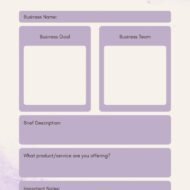Posted by Managementguru in Business Management, Financial Management, How To, Startups
on Sep 25th, 2015 | 0 comments

When you write your business plan, start with the basics, and write the things that you have already thought about. The name of your business, your goals, your team and the products/services you propose to offer. This gives a clean headstart to further evolve your business plan. A business plan should mainly focus on the future fund flow that will pique the interest of the bankers you are trying to pitch for a loan or investors whom you want to genuinely impress. Here are a few Business Plan Starter Questions 1. What is your mission statement? Your mission statement is what you want to do now, and your vision statement is what you want to do in the future. 2. What are your top keys to success? Don’t write a laundry list of keys, keep it simple, and focused. 3. What is your value proposition? Why should someone do business with you? 4. What are your core competencies or skills? 5. What is your start up budget? Write it like a grocery list, at first, and add up the numbers. 6. The executive summary is written last; after the entire business plan is, absolutely, finished. Think of the executive summary as your movie trailer, build to attract interest in your business. Writing a business plan is a huge undertaking, and if you have never done it before, it is down-right scary. Planning to start a small business? Think no more.. You’ve hit the right spot and we have compiled all that is necessary to win over the challenges of a new startup. This guide will serve as a jump start for your new venture and make it exciting. The web has loads of sample plans, but how do you, really, write your own business plan, your own way? How do you write the plan that accomplishes the goals that you want to accomplish in your business? This Business Planner will make your process simple and hassle free! How to Start a Small Business at Home – Read on to find out the Benefits and Advantages of a Home-Based Business Ask Yourself the Right Questions First things first, you have to start thinking about what you’re not thinking about. Ask yourself the right questions, about your business and put it into your plan notes. The best way to write a business plan is to write it in small segments or pieces. Forget trying to consume, writing the entire plan as a large, mammoth, assignment. It is, too, overwhelming, give yourself a break, and write small bursts, of information. It is easier, to write your top three to five business objectives, clearly and concisely when you are not looking down the barrel of a twenty-thirty page business plan....


